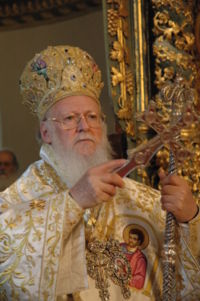Orthodox “Easter” Today

Born as Dimitrios Arhondonis, he has been known as the Ecumenical Patriarch Bartholomew I of Constantinople since 1991
The following item in yesterday’s news was of interest:
Eastern Orthodox faithful celebrate Easter tomorrow
The Gazette, Montreal – April 26, 2008
Montreal’s Eastern Orthodox Christian community – Greeks, Ukrainians, Russians, Serbians, Armenians and Romanians – is observing Holy Week…
There are 11 major Orthodox churches in Montreal, serving about 100,000 people. The differences among them are ethnic or linguistic, not theological.
The spiritual focus today is one of quiet mourning, solemn meditation and strict fasting, recalling Jesus’s entombment.
Pascha, or Easter, will be celebrated after midnight tonight.
The two Christian communities – Orthodox and Western rite – observe Easter vigils on different dates because they follow different calendars.
Orthodox churches rely on lunar cycles to fix the date for Easter. The rest of the Christian world accepts the Gregorian calendar introduced by Pope Gregory XIII in 1582. http://www.canada.com/montrealgazette/news/story.html?id=db21a78e-edc1-408d-bbd8-3ea9aa570086
And although the Orthodox are off by about a week (the last day of Unleavened Bread was yesterday and Passover was sunset after April 18th), they are closer to the date than the Catholics or Protestants (most of whom do not realize that what they call Easter was originally supposed to be Passover moved to a Sunday observance.
The Orthodox Church reports this brief explanation of a change to Sunday in one of its timelines:
193 A.D. – Council of Rome, presided over by Bishop Victor, condemns the celebration of Pascha on Nisan 14, and addresses a letter to Polycrates of Ephesus and the Churches in Asia.
193 A.D. – Council of Ephesus, presided over by Bishop Polycrates, and attended by several bishops throughout Asia, reject the authority of Victor of Rome, and keep the Asian paschal tradition (Markou, Stavros L. K. An Orthodox Christian Historical Timeline. Copyright © 2003 OrthodoxFaith.com).
Although It appears that the Orthodox Church officially began to accept Easter around 190 A.D. (as it, as a Sunday holiday, originated in Rome a few decades earlier, though the churches in Asia Minor did not accept the change from Passover on the 14th of Nisan), those in Asia Minor (where it claims apostolic succession) did not accept the Roman change. Yet, the Orthodox Church officially made the change, based not on the Bible, but on a church council/synod.
Most who call themselves Christians do not realize that Passover was celebrated by pretty much all those who professed Christ in the first and second centuries. And that the change to Easter Sunday was because of Roman pronouncements.
The change involved MORE than simply the date–the practices and meaning were also sadly changed from that the early true Christian church had as history records.
Some articles of possibly related interest may include:
Some Similarities and Differences Between the Orthodox Church and the Living Church of God Both groups have some amazing similarities and some major differences. Do you know what they are?
Melito’s Homily on the Passover This is one of the earliest Christian writings about the Passover. This also includes what Apollinaris wrote on the Passover as well.
Location of the Early Church: Another Look at Ephesus, Smyrna, and Rome What actually happened to the primitive Church? And did the Bible tell about this in advance?
Apostolic Succession What really happened? Did structure and beliefs change? Are many of the widely-held current understandings of this even possible? Did you know that Catholic scholars really do not believe that several of the claimed “apostolic sees” of the Orthodox have apostolic succession–despite the fact that the current pontiff himself seems to wish to ignore this view? Is there actually a true church that has ties to any of the apostles that is not part of the Catholic or Orthodox churches? Read this article if you truly are interested in the truth on this matter!
Passover and the Early Church Did the early Christians observe Passover? What did Jesus and Paul teach? Why did Jesus die for our sins?
Did Early Christians Celebrate Easter? If not, when did this happen? What do scholars and the Bible reveal?
 |
Tweet |
|